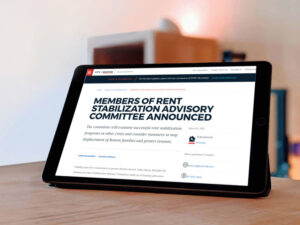How Do Rent Control Boards Benefit the Wealthy and Well Connected?
| . Posted in News - 3 Comments
Under rent control, Boston housing providers should be expected to hold units vacant longer, waiting for the perfect applicant to arrive. This happened in Cambridge. During Cambridge’s rent control years, many well-off individuals infamously occupied rent controlled housing. This includes Cambridge Mayor Ken Reeves, 1992 to 1995, who lived in a spacious rent controlled apartment, and state Supreme Court Justice Ruth I. Abrams, who also lived in rent controlled housing.

Colliers donated $88,330.12 to influence Massachusetts politics prior to being named on the Rent Stabilization Advisory Committee (RSAC). Their website is a beautiful example of how the RSAC was not representative of housing providers in Boston and Massachusetts. Fair Use.
We have discussed elsewhere how this framework has an unlawful disparate impact on the basis of race. When landlords cannot be assured of keeping pace with inflation, and cannot even be sure of evicting a bad renter, landlords hold apartments vacant longer waiting for a perfect applicant. The result is that the renters most likely to get a rent controlled apartment are the least likely to need it. The Black-white wealth gap and other systemic factors caused only 8% of rent controlled units to go to renters of color, even though at the time 22% of the city’s residents were residents of color.
So who would propose such a backwards scheme? The mayor’s appointees on the Rent Stabilization Advisory Committee are not disadvantaged renters. Nor are they residential landlords. The appointees are primarily well-connected and institutional campaign donors. And weighted by dollars, they are preeminently real estate developers.
As of March 16, 2022, shortly after the Rent Stabilization Advisory Committee was announced, the Massachusetts Office of Campaign and Political Finance identified 17 of the 25 appointees as previous or current personal contributors to Massachusetts political races:
- Kathy Brown, coordinator at Boston Tenant Coalition, had given $135.
- Carolyn Villers, executive director at Mass Senior Action, had given $140.
- Lauren Song, senior attorney at Greater Boston Legal Services, had given $175.
- Kimberly Sherman, president of Related Beal, had given $500.
- Beyazmin Jimenez, Abundant Housing Massachusetts Board president, had given $770.94.
- Karen Chen, executive director at Chinese Progressive Association, had given $1,352.
- Megan Sandel, associate professor of pediatric medicine at Boston University, had given $1,500.
- Chanda Smart, CEO at Onyx, had given $1,700.
- Michael Kane, executive director at HUD Tenant Alliance, had given $3,415.
- Lisa Owens, executive director at Hyams Foundation, had given $4,125.
- Jeanne Pinado, vice president of capital markets at Colliers International, had given $5,004.
- Joe Kriesberg, president of Massachusetts Association of Community Development Corporations, had given $7,260.
- Curtis Kemeny, CEO and president of Boston Residential Group, had given $13,835.50.
- Dermot Doyne, local landlord and business owner, had given $18,250.
- Josh Zakim, founder and executive director at Housing Forward MA, had given $19,407.
- Kirk Sykes, managing partner at Accordia Partners, had given $40,513.
- Brian Kavoogian, managing director (or partner) of National Development, had given $143,482.35.
As of March 16, 2022, the Massachusetts Office of Campaign and Political Finance identified 21 of the 25 organizations represented by appointees as previous or current contributors, via their employees, to Massachusetts political races:
- Employees disclosing that they worked for the Harvard Joint Center for Housing Studies gave in aggregate $70.
- Employees disclosing that they worked for Abundant Housing Massachusetts gave in aggregate $368.
- Employees disclosing that they worked for Mass Senior Action gave in aggregate $936.
- Employees disclosing that they worked for the HUD Tenant Alliance gave in aggregate $1,368.
- Employees disclosing that they worked for the North Atlantic States Regional Council of Carpenters gave in aggregate $1,425.
- Employees disclosing that they worked for Onyx gave in aggregate $1,475.
- Employees disclosing that they worked for Accordia Partners gave in aggregate $1,805.
- Employees disclosing that they worked for City Life/Vida Urbana gave in aggregate $4,526.
- Employees disclosing that they worked for the Massachusetts Association of Community Development Corporations gave in aggregate $6,645.
- Employees disclosing that they worked for the Hyams Foundation gave in aggregate $7,328.
- Employees disclosing that they worked for the Chinese Progressive Association gave in aggregate $7,670.19.
- Employees disclosing that they worked for Housing Forward MA gave in aggregate $8,026.
- Employees disclosing that they worked for the Boston Teachers Union gave in aggregate $15,362.58.
- Employees disclosing that they worked for Related Beal gave in aggregate $15,381.
- Employees disclosing that they worked for the 1199 SEIU gave in aggregate $18,443.84.
- Employees disclosing that they worked for Boston Residential Group gave in aggregate $18,485.
- Employees disclosing that they worked for Urban Edge gave in aggregate $19,494.46.
- Employees disclosing that they worked for the Greater Boston Legal Services gave in aggregate $48,969.
- Employees disclosing that they worked for Colliers International gave in aggregate $88,330.12.
- Employees disclosing that they worked for National Development gave in aggregate $308,222.
- Employees disclosing that they worked for Boston University gave in aggregate $597,780.57.
If someone were in the market to purchase distressed properties, they could hardly do better for themselves than to enact a subjective rent control scheme. Rent control would drive mom and pop housing providers to sell under duress. If such an investor were well enough connected to sit on the rent control board, or have sway there, they could pick and choose which properties to hammer down.
City Life/Vida Urbana, to cite one example, have demonstrated their interest both in political appointment and in real estate acquisition. They were appointed to the Rent Stabilization Advisory Committee twice (once directly, via Helen Mathews-Turner, and once discreetly, via prior executive Lisa Owens). Furthermore, with the help of the Mayor and others, City Life/Vida Urbana co-acquired 114 apartments across 36 buildings in East Boston on Oct. 14, 2022.






